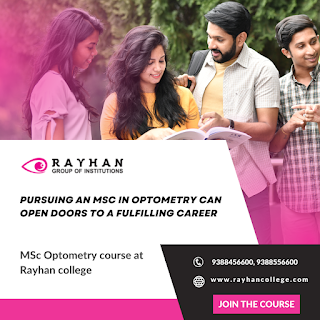BSc vs Diploma in Optometry — Which Course Should You Choose?

Choosing a career in eye care is a meaningful step towards improving people’s quality of life. For students in Kerala aspiring to become eye care professionals, optometry is a field that offers both stability and opportunity. However, one of the first decisions you’ll face is choosing between a Bachelor’s degree and a diploma course. This guide breaks down the key differences to help you make an informed choice.
Understanding Optometry
Optometry focuses on the examination, diagnosis, and management of eye-related conditions. As an optometrist, you play a crucial role in detecting vision problems and providing corrective solutions, including prescribing glasses or contact lenses.
Kerala has a growing demand for skilled optometrists, making this a promising field whether you pursue a diploma or a degree at a reputed institution such as BSc optometry colleges in Kerala.
1. Duration of Study
A BSc Optometry program typically spans 4 years, including practical training or internships.
In contrast, optometry diploma courses in Kerala are generally 2 years long, with a shorter practical component.
If you are looking for a quick entry into the workforce, a diploma may be attractive. However, a BSc degree offers more in-depth knowledge and a stronger academic foundation.
2. Depth of Knowledge
A BSc in Optometry covers a wider range of subjects — from ocular anatomy and physiology to advanced diagnostic techniques and contact lens fitting.
Diploma courses are more focused on the practical aspects of optometry, often preparing students for technician roles.
For students who want to keep doors open for higher education, research, or specialization later, opting for a BSc program at a recognized college is advisable. You can explore available programs here.
3. Career Opportunities
With a BSc degree, you can work as an independent optometrist, open your own practice, or even pursue higher studies like Master’s programs or fellowships. You are also eligible for teaching roles in academic institutions.
A diploma holder typically works under supervision in hospitals, optical shops, or vision clinics as an optometry assistant or technician.
4. Salary Expectations
Naturally, with a BSc, starting salaries tend to be higher compared to diploma holders, due to the broader scope of responsibilities and expertise. Additionally, the long-term career growth potential is more substantial with a degree.
5. Eligibility and Admission
Most BSc optometry colleges in Kerala require completion of higher secondary education (12th grade) with subjects like Physics, Chemistry, and Biology. Diploma courses may have similar requirements, though some institutions offer flexibility for students from other streams.
Conclusion
Both BSc and diploma courses offer pathways into Kerala’s thriving optometry field. Your choice should depend on your career aspirations, time commitment, and long-term goals. Taking the time to explore course details and career prospects can ensure your decision aligns with your future ambitions.

.png)

Comments
Post a Comment